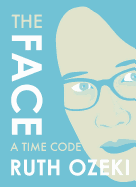
In The Face: A Time Code, one of the first installments of a series of personal nonfiction, novelist Ruth Ozeki (A Tale for the Time Being) chronicles a three-hour examination of her own face. The three inaugural pocket-sized paperbacks from Restless Books, all titled The Face, with different subtitles, also include titles by Chris Abani and Tash Aw.
As her fans would expect, Ozeki frolics with language and perspective, but respects the authors' challenge of exploring "the world and their place within it from the starting point of their own face." Ozeki, a Zen Buddhist priest, notes a Zen koan that teaches "your face before your parents were born" is your true face. She chose staring in the mirror as an exercise in "immersive attention" to her meditation.
Chapters alternate among Buddhist teachings, reminiscences and a second-by-second account of the painfully long time she spent staring at herself. "This experiment is ridiculous. Narcissistic. Solipsistic. Banal. I don't want to do it anymore. Isn't it time for coffee?" She persists.
Ozeki recalls the confusion her Japanese-Caucasian features caused in the post-World War II United States. "What are you?" strangers would ask. At 59, she sees heartbreaking and corrosive ageism. "I want to look my age," adding a phrase central to Zen teachings: "Just this."
She compares the Japanese Noh theater ritual of actors donning masks in a "mirror room," during which they focus on the mask to become filled with the emotion of the role, and writing. A reader "enters the room" of a book and becomes the character, which is "why we read novels... to wear another's face, to live inside another's skin." --Cheryl Krocker McKeon, manager, Book Passage, San Francisco

